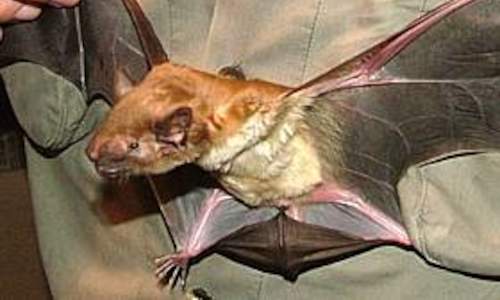
When visitors at Letaba Rest Camp in the Kruger National Park found one of the familiar bat houses in the camp had collapsed, little did they realise a cycle was set in motion that would see some of the inhabitants on a journey to Hoedspruit, Gauteng and back to Letaba.
These bat houses accommodate predominately the Angolan Free Tail bats, which are also known to frequent house roofs as well as many of the high-water bridge crevices in the KNP. October to May form their breeding season and as the collapse was in March, many young bats were encased in the bat house.
The visitors alerted the Kruger staff who reacted quickly with a massive 'capture' operation.
The particular bat house that collapsed was a 'bat hotel' and is multilayered so the rescue had to be done in stages as the fragments of the house were cleared. All adult bats captured were placed in trees giving them a high vantage point from which they could take flight.
All young (no hair or in capable of flight) or injured bats were placed in the awaiting box. After the bat house was cleared, the next problem was what to do with an estimated 200 juvenile bats, the main challenge being Kruger's strict no interference policy that prohibits intervention in the form of rehabilitation, unless in extenuating circumstances.
Conversations with the local ranger Joe Nkuna, regional ranger Louis Olivier, and general manager conservation Dr Freek Venter decided that as 'bat houses' are considered human interference and while useful, are considered an unnatural habitat, we could therefore look for placement for the surviving bats as long as there were no disease and transport issues from the state vets. This saw the juvenile bats being transported with the permission of state vet Dr Lin Mari Lorist to Moholohlo Animal Rehabilitation Centre under the care of Brian Jones.
Sadly due to temperatures and injury many of the bats did not survive the journey. The following morning's count confirmed 120 surviving bats with 40 dead on arrival. Several of the survivors were adults, which had simply been shocked by the experience and were able to be released once it was confirmed they could fly. This left 84 juvenile bats dependent on their now human carers.
Brian Jones and his volunteers undertook what ended up being temporary care of the bats to stabilise them for the first week. A week of late night feeds and the costs involved in raising so many bats, required Brian to look for alternative rehabilitation options. Eventually the bats were moved to Johannesburg to "Free Me", a rehabilitation centre at Reitvlei Nature Reserve, under the guidance of Nicci Wright.
The bats have since been successfully weaned and are fully grown adults. Upon request of Free Me the bats will all be returning to the KNP and will be rehabilitated into the wild again bringing the story full circle. Through discussions with the conservation department it was agreed that the bats will be released at the Letaba High Water Bridge to allow them to integrate into a natural colony rather then re-introducing them to another bat house.
The first release was undertaken by Jane Burd from Free Me in early May 2011.
A temporary flight cage was erected to allow the bats to acclimatise to the weather patterns in the lowveld after which they were released.
While the ending is a feel good story of sorts a lesson was learnt through this, as none of the houses when installed were cemented into the ground and the combination of guano and urine from the bats had attracted an unexpected multitude of insects which had begun eating through the poles on which the bat houses were placed.
With a huge effort from technical services under the guidance of Riana Harmse, all the remaining bat houses were careful dug out, supported by a grader and then replanted and cemented in to the ground to ensure this is not a repeat occurrence.
Note: While bat houses are useful in assisting in the control of bats, it must be emphasised that they cannot be seen as a lone control method and the bat houses at Letaba were only installed after extensive research and in conjunction with a maintenance plan for the infested units. If this is not done you will simply be creating more accommodation for bats rather than controlling a problem. Anyone wanting to use bat houses should feel free to contact People and Conservation, Letaba for advice and information on how the installation was carried out.

 If you are interested in bats, you could find yourself discovering a bat that has never been discovered before and have it named after you! ...
If you are interested in bats, you could find yourself discovering a bat that has never been discovered before and have it named after you! ...